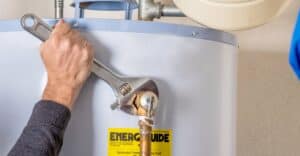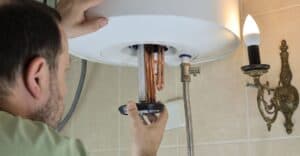When the hot water runs out because the dishwasher or clothes washer is on while you are in the shower the only thing you can blame is your undersized storage water heaters. No one likes to get hit with a bolt of cold-water right when they are getting the shampoo out of their hair. However, there are other options, depending on your budget.
Traditional storage water heaters operate on the basis of keeping a large amount of water, usually running between 28 and 100 gallons, at a specific temperature at all times. The factory settings for most storage water heaters is 140 degrees F, while the US Dept. of Energy suggests setting it to 120 degrees for energy saving.
Regardless of the actual temperature, this is pretty hot, and it requires that your fuel source, either electric or gas, runs often to keep the water at this temperature. This means that even when you are on vacation your hot water tank is ready to be used. Used for what?
What Is A Tankless Water Heater?
A tankless water heater uses gas or electricity to heat the incoming water instantaneously and on-demand. This means that the tankless water heater never runs unless you physically turn a knob or press a button. This also means that hot water is virtually endless. Have a large tub to fill or a Jacuzzi? Well, that is child’s play to a tankless water heater. It just runs until you turn the water off. Nothing simpler.
A tankless water heater is usually installed on a wall and takes up significantly less room than a storage water heater. This will save you space for more garage sale and flea market hidden treasures. Installation requires hooking up the water line to one side of the unit. The hot water line comes out the other end. Venting is required for the units, particularly the gas units.
For the water to get instantaneously heated to the correct temperature a lot of energy is required. However, once set up with the proper venting, a tankless water heater will deliver between 2-5 gallons of water a minute. The gas-powered units will deliver more gallons per minute than the electrical units.
Pros and Cons Of A Tankless Water Heater
No technology is perfect. This can’t be truer than in the home. There are the benefits and then there are the downsides. You need to weigh the pros and cons personally and in light of your situation. There is no clear yes or no to whether you should convert to a tankless water heater.
Here is a list of the most common pros and cons as they relate to tankless water heaters. Take stock of your energy bills, hot water usage, the number of faucets and appliances that use hot water, and the age and condition of your current storage water heater.
Pro: Only Heat When Water Is Running
Tankless water heaters only run while you are running the hot water. So, this means that your water heater won’t be using any energy while you are sitting on a beach in the Caribbean a million miles away. However, your storage water heater will still be using electric energy or gas even when you aren’t using it and don’t need it.
Con: House Needs May Outweigh Flow Rate
A tankless water heater can only heat but so much water at any given time. This means that the tankless water heater that has a flow rate between 2-5 gallons per minute can’t be changed or increased. On the other hand, a storage water heater can deliver as much hot water to as many places as needed until the tank runs out.
This is important to note because if you have a big family and many bathrooms and faucets you may need to buy more than one tankless water heater to satisfy all of the demands. It is very common to buy a single unit for each faucet, which can be installed under the sinks.
Pro: More Compact for Space Savings
These tankless water units can be as large as a medicine cabinet or as small as a briefcase. It all depends on the flow rate you are looking for.
Con: Still Need Dedicated Venting
If you are rerouting gas to the unit you will need significant venting through the walls to the outside. This can be problematic if you are looking to install multiple gas units. The better option would be to install electric units.
Pro: They Can Save Money On Utilities
Over the length of the year, you can save on your utilities. This is based on the idea that you can save money on gas or electricity if you are only using that utility when you have the water on. Estimates have put the energy-saving anywhere between 10 – 40% based on the size of your house and your hot water needs.
Con: Can Have A Large Upfront Cost
Costs do depend on the size and the number you purchase. Smaller units will be cheaper than larger units. However, if your old water heater died and you need something new. Then the upfront cost is a sunk cost either way and not really a Con.
Pro: They Last Longer Than A Regular Unit
Tankless water heaters can last around 20 years and even longer if regularly maintained. AS a comparison a storage water heater will usually last only 10 -15 years. So, the upfront cost is an expense, but it is an expense that lasts longer than its competition.
Con: Will Take Longer To Get Your Return On Investment Back
This con isn’t necessarily true. If you need a new water heater and the choice is between storage and tankless, then the tankless will start saving you money on electricity immediately. But if your current water heater works well and you just are looking to switch then you should weigh all of your options, including the price.
Installation Requirements
A tankless water heater requires two hookups: on to the waterline and another going out as the hot water line. It will also need a vent and hung on the wall. If it is a gas unit the gas line will need to be extended to the hanging unit. If it is an electric unit the electricity will need to be wired safely and securely.
Do I Need To Hire A Contractor?
Yes, it is always recommended that you hire a trained professional whenever part of the job requires electrical, gas lines, and proper ventilation of deadly gases. This is the case with all types of tankless water heaters. A contractor will also be able to gauge how many and what sizes your home needs so you don’t under engineer the delivery of hot water.
Bottom Line On Tankless Water Heaters
Tankless hot water heaters are an amazing modern solution to water sitting in a talk using gas or electric to stay hot even when you aren’t around. They are small, efficient (up to 98% efficient), effective (deliver hot water at 2-5 gallons per minute), and cost savings.
However, if you are unsure if you need one or should stay with your storage water heater speak to a licensed plumber today. They will be able to give you the facts, and a free quote based on your specific circumstances and home needs.

.svg)

